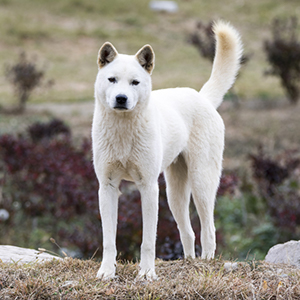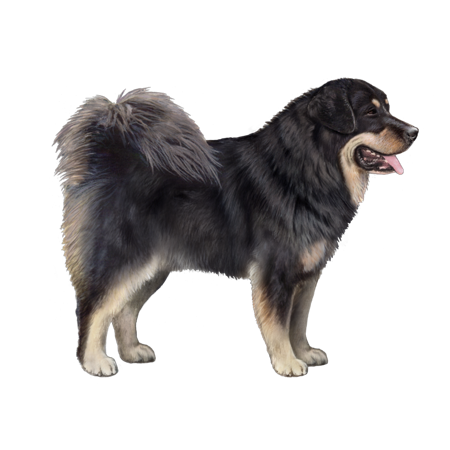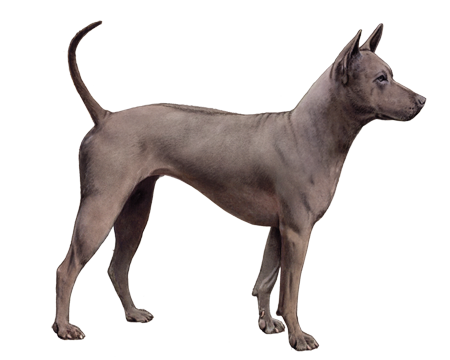
Jindo
The Jindo is an excellent hunter, guard dog, and faithful companion. Athletic dogs that require a lot of exercise, Jindos are also known for their loyalty, friendliness, and developing deep bonds with their people.
Interested in discovering if your dog is a Jindo?
Check out Wisdom Panel's DNA tests.

Jindo Traits
General Appearance
Jindos are medium-sized, well-proportioned dogs with pricked ears and curled tails. Their body language is alert and brave.
Coat and Coloring
These double-coated dogs have soft, lightly colored undercoats and stiff hair on their outer coats. Jindos can be red fawn, white, black, black and tan, wolf grey, or brindle.
Distinctive Physical Traits
Jindos have high-set tails that curve like a sickle. When the breed's tail is down, the tip should touch the hocks.
Jindo Temperament
Jindos are smart, alert, dominant dogs that vie for the highest spot in the pack order. These confident canines will challenge inexperienced owners. The breed also develops strong bonds with its owner and tends to be a "one-man dog," attached to a single person. For this reason, Jindos don't make the best family dogs.
A combination of intelligence, strong predatory instincts, and desire to control (and expand) their territory makes Jindos master escape artists. They look for ways to break free of their enclosures and defend their territories from all perceived intruders. If a Jindo feels threatened, it will respond with deep, resounding barking.
Their relative unwillingness to accept new people means that Jindos do not do well in homes with many different people coming and going. The breed also prefers to be the master of its domain and may be reactionary toward other dogs. Though some Jindos accept other pets, you should avoid bringing a Jindo into a home with a strong alpha dog—especially a male. In multi-pet households, opposite-sex pairs are best.
In light of this, carefully consider whether you have the skill and patience to train this proud breed. Owners who are unprepared for the Jindo's unique personality and needs often end up surrendering or abandoning their dogs.
The same traits that make Jindos less-than-ideal family pets—their sense of loyalty and desire to protect their territories—lead them to excel as guard dogs.


Jindo History
Hailing from an island off the coast of South Korea, the Jindo is also called Jindo-kae and Jindo-kyon. ("Kae" and "kyon" are Korean words for "dog.") This breed has lived alongside humankind for thousands of years.
Experts believe Jindos to be descendants of other spitz-type breeds. And they share the stamina, intelligence, and high prey drive of these ancestors—making them excellent hunting dogs.
In 1962, the Jindo earned the designation of Korean national treasure under the Republic of Korea Preservation of Cultural Assets.
Jindo Care
Nutrition
A lean Jindo is not a sign that the dog is malnourished. These dogs tend to be light or picky eaters. Rather than freely feed a Jindo or add treats or high-value foods to their kibble—which can actually encourage picky eating—offer a high-quality dog food at scheduled meal times.
Grooming
Jindos have thick double coats that help repel dirt and water, keeping them from developing a "dog" smell. Despite being a clean breed, they do require regular grooming. Weekly brushings help remove shed fur. And extra grooming during seasonal shedding periods—when Jindos blow their coats—will help keep them looking good.
Jindos also require nail trims and often feel more relaxed when their owners handle the task. Routine dental care should include regular teeth brushing, as well as professional dental cleanings.
Exercise
When owners don't provide adequate exercise, the high-energy Jindo will find ways to satisfy its need to move (which may mean escaping). These dogs prefer high-intensity activities—such as hunting, lure coursing, and agility.
Sometimes used as sled dogs, Jindos welcome opportunities to work, especially in cold weather. Mental stimulation in the form of tricks or games is also important. On walks, be sure to use a strong leash and harness, and be prepared to restrain your Jindo if they see other dogs. Steer clear of the dog park for the same reasons.
Training
The breed has been described as "too intelligent" for some owners. But the same smarts that allow Jindos to learn how to open gates and crates also make them apt students.
This breed learns best with positive reinforcement. If training is too heavy-handed, Jindos may shut down. Untrained, they can exhibit unchecked dominance. Early socialization is essential to subdue this breed's guarding tendencies.
Breed Group
Asian and Oceanian
The Asian and Oceanian group is comprised of breeds whose origins lie in Asia, which have spread as far as Australia, the islands of the Pacific, and the Arctic. This group is possibly the most ancient of all breed groups and were bred for a variety of purposes, including guarding, hunting, and as draft dogs.
Resources
http://www.jindos.org/breed-info.html
https://www.akc.org/dog-breeds/jindo/
http://www.fci.be/Nomenclature/Standards/334g05-en.pdf
Reviewed July 26, 2020 by Cindy Elston, DVM, MPH












































